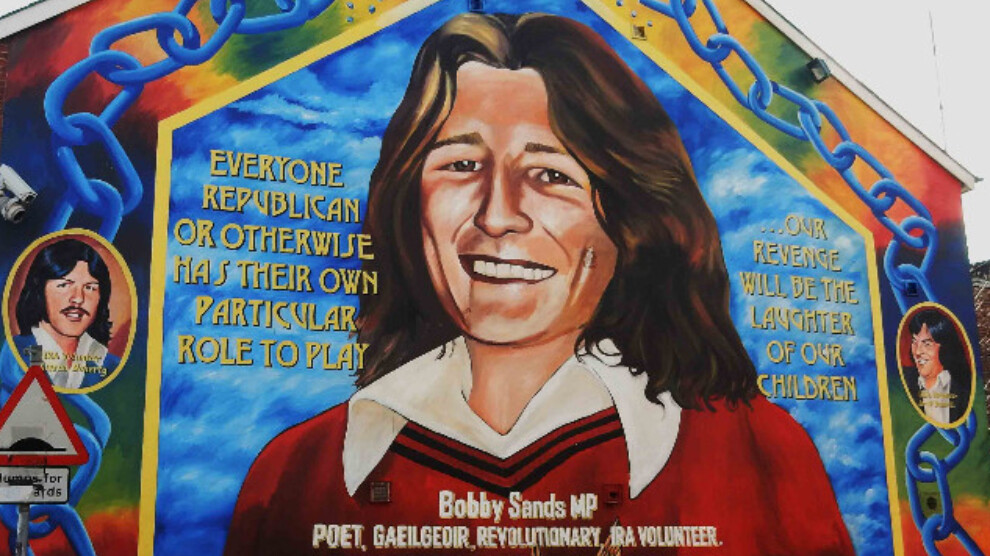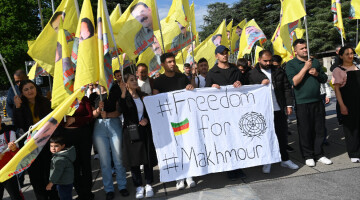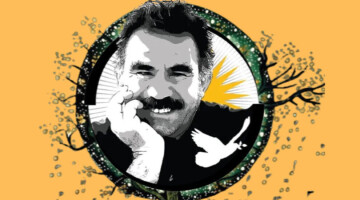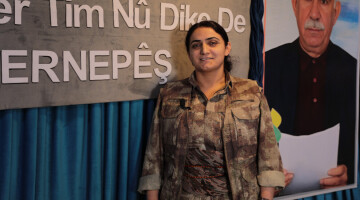PKK and PAJK prisoners are on hunger strike in Turkish prisons since 27 November 2020. Solidarity hunger strikes are going on in Maxmur Camp and Greece demanding the end of isolation against Abdullah Ocalan.
Many are the similarities with the hunger strike carried out by Irish republican prisoners in 1981 in Long Kesh prison outside Belfast.
The infamous H-Blocks are known worldwide as is the name of Bobby Sands.
Bobby Sands died on 5 May 1981, 40 years ago, after 66 days on hunger strike.
Sands was an Irish republican, an IRA Volunteer and a key figure in the fight against British imperialism in the north of Ireland during the 1970s and early 1980s.
He came to public prominence during the 1981 hunger strike when he led the protest by men in the H-Blocks of Long Kesh and women in Armagh Jail who sought political prisoner status. Bobby endured years of solitary confinement and beatings.
During his imprisonment he was elected MP for the constituency of Fermanagh and South Tyrone.
Bobby began his hunger strike on 1st March 1981 and died after sixty-six days on the 5th May 1981.
The prisoners had five demands:
(1) No prison uniform;
(2) No prison work;
(3) Free association;
(4) Full remission;
(5) Visits, parcels, and recreational/educational facilities.
On December 19th, 1980, Bobby issued a statement that the prisoners would not wear prison-issue clothing nor do prison work. He then began negotiations with the prison governor, Stanley Hilditch, for a step-by-step de-escalation of the protest.
But the prisoners’ efforts were rebuffed by the authorities: ‘We discovered that our good will and flexibility were in vain,’ wrote Bobby. It was made abundantly clear during one of my co-operation’ meetings with prison officials that strict conformity was required. which in essence meant acceptance of criminal status.
In the H-Blocks the British saw the opportunity to defeat the IRA by criminalising Irish freedom fighters but the blanketmen, perhaps more than those on the outside, appreciated before anyone else the grave repercussions, and so they fought.
Bobby volunteered to lead the new hunger strike. He saw it as a microcosm of the way the Brits were treating Ireland historically and presently, Bobby realised that someone would have to die to win political status.
He insisted on starting two weeks in front of the others so that perhaps his death could secure the five demands and save their lives.
For the first seventeen days of the hunger strike Bobby kept a secret diary in which he wrote his thoughts and views, mostly in English but occasionally breaking into Gaelic. He had no fear of death and saw the hunger-strike as something much larger than the five demands and as having major repercussions for British rule in Ireland.
The diary was written on toilet paper in biro pen and had to be hidden, mostly carried inside Bobby’s own body. During those first seventeen days Bobby lost a total of sixteen pounds weight and on Monday, March 23rd, he was moved to the prison hospital.
On March 30th, he was nominated as candidate for the Fermanagh and South Tyrone by-election caused by the sudden death of Frank Maguire, an independent MP who supported the prisoners’ cause.
The next morning, day thirty-one, of his hunger-strike, he was visited by Owen Carron who acted as his election agent. Owen told of that first visit ‘Instead of meeting that young man of the poster with long hair and a fresh face, even at that time when Bobby wasn’t too bad he was radically changed. He was very thin and bony and his hair was cut short.’
Bobby had no illusions with regard to his election victory. His reaction was not one of over-optimism. After the result was announced Owen visited Bobby. “He had already heard the result on the radio. He was in good form alright but he always used to keep saying, ‘In my position you can’t afford to be optimistic.’
In other words, he didn’t take it that because he’d won an election that his life would be saved. He thought that the Brits would need their pound of flesh. I think he was always working on the premise that he would have to die.”
At 1.17 a.m. on Tuesday, May 5th, having completed sixty-five days on hunger-strike, Bobby Sands MP, died in the H-Block prison hospital at Long Kesh. Bobby was a truly unique person whose loss is great and immeasurable.
He never gave himself a moment to spare. He lived his life energetically, dedicated to his people and to the republican cause, eventually offering up his life in a conscious effort to further that cause and the cause of those with whom he had shared almost eight years of his adult life.
In his own words: “of course can be murdered but I remain what I am, a political POW and no-one, not even the British, can change that.”
With info from: Bobby Sands Trust















